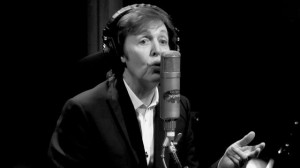 Despite what happened during the opening ceremonies of the Olympics when he couldn’t quite hit “Hey Jude,” Paul McCartney has a pretty nice tone to his voice at age 70.
Despite what happened during the opening ceremonies of the Olympics when he couldn’t quite hit “Hey Jude,” Paul McCartney has a pretty nice tone to his voice at age 70.
And while singing an album of standards is something most pop stars get around to sometime in their career (Rod Stewart made a whole new career move; Ringo Starr got to it 40 years ago; Brian Ferry dabbled in it a bit), Paul is just getting around to it this year.
“Kisses on the Bottom” came out months ago, around the time to make “My Valentine” timely. He seemed to be everywhere performing it, particularly at the Grammys.
But to reach the perfect audience, he’s found PBS, which is home to similar whole record promotions from Tony Bennett and all manner of oldies acts.
So here he is on “Great Performances” (PBS, 9 p.m., check local listings) singing selections from the album in the main studio of Capitol Records for a program called “Paul McCartney’s Live Kisses.”
The setting becomes an underlying story, the place where Frank Sinatra and Nat King Cole recorded, meant to add inspiration for a guy looking back.
By and large the album was already recorded and his live performance in the studio for a handful of people was obviously done for this promotional film, shot largely in black and white to further push the nostalgic buttons. (Although his last documentary “The Love We Make” about his 9/11 concert in New York, was also in black and white).
“Live Kisses” is worth seeing just to be reminded of all the people he was able to draw into the studio with him, with Diana Krall on piano, John Pizarelli on guitar, but also Joe Walsh and, seeming awfully self-effacing for a guy named God, Eric Clapton, though like Stevie Wonder, Clapton is interviewed but not heard playing his part on “My Valentine,” the only original song on the work.
But he treats the other songs quite tenderly, from “Always,” “More I Cannot Wish You” to “The Glory of Love,” preserving their musical introductions and letting them breathe.
You get the feeling that people are waiting around to hear him sing a Beatles song at the end or something (a mash up of his own “Blackbird” with “Bye Bye Blackbird” would have worked), but he never does. But when he talks about the origin of these sons he talks about hearing them at his uncle’s house on New Year’s Eve or at Auntie Gin’s (yes there really was an Auntie Gin that he mentioned in “Let Em In”).
It’s a swell little special, made of course to sell the record, and in that regard it comes very close to winning as well (though local stations will offer it is a premium).